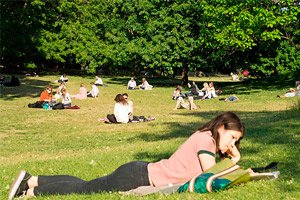
All iLive content is medically reviewed or fact checked to ensure as much factual accuracy as possible.
We have strict sourcing guidelines and only link to reputable media sites, academic research institutions and, whenever possible, medically peer reviewed studies. Note that the numbers in parentheses ([1], [2], etc.) are clickable links to these studies.
If you feel that any of our content is inaccurate, out-of-date, or otherwise questionable, please select it and press Ctrl + Enter.
For city dwellers, even 15 minutes in nature can improve mental health
Last reviewed: 03.08.2025

Green spaces improve mental health – especially in busy cities. New research from Leiden and Stanford University shows how nature promotes well-being in cities and offers low-cost ways to make city life healthier for everyone.
By 2050, 70% of the world’s population is expected to live in cities, and mental health issues associated with city living – such as anxiety and mood disorders – are becoming increasingly common. A new study by Stanford University’s Natural Capital Project (NatCap) and Leiden University shows that even short periods of time in nature can alleviate these mental health issues. The findings, published in the journal Nature Cities, offer recommendations for urban planners, policymakers, and other stakeholders on how to use green space as a mental health solution that also lowers temperatures and reduces carbon emissions.
Further exploring the link between nature and mental health
“Previous studies have documented strong links between contact with nature and mental health,” says Anne Guerrie, chief strategy officer and lead researcher at NatCap and senior author of the paper. “But most studies fail to establish causation, are poorly generalizable, or are not designed to distinguish between the effects of different types of nature. This analysis helps fill that gap.”
The researchers analyzed data from nearly 5,900 participants in 78 field studies, including randomized controlled trials and before/after intervention studies. All forms of urban nature improved mental health, but urban forests stood out — especially in reducing depression and anxiety.
Young adults saw even greater benefits, which is notable given that most mental health disorders begin before age 25. Interestingly, simply sitting or relaxing in green spaces reduced negative mental health symptoms even more than physical activity, although both increased positive feelings like alertness and mindfulness.
Leiden researcher Roy Remme says: "Our results show that even short-term contact (less than 15 minutes) with nature can bring significant mental benefits. Moreover, longer exposure to nature (more than 45 minutes) is associated with even greater reductions in stress and increases in vitality."
Based on their findings, the researchers recommend not only protecting large urban parks and forests, but also adding smaller “pocket parks” and more street trees to improve access to nature within cities. Simple changes — such as more windows with greenery, quiet corners with nature, or community programs like guided meditations in parks — can also have significant mental health benefits. These are low-cost ways to support public health in cities.
"It's not just good for cities, it's good for us."
On a personal level, Yingjie Li, a NatCap postdoctoral fellow and lead author of the study, says working on the project has improved his own lifestyle. He walks to work more often and has become more interested in observing birds and plants along the way.
"I also share these experiences with friends and encourage them to notice how even short moments in nature can change how they feel. This work has helped me understand that urban nature is not only good for cities – it is good for us."
